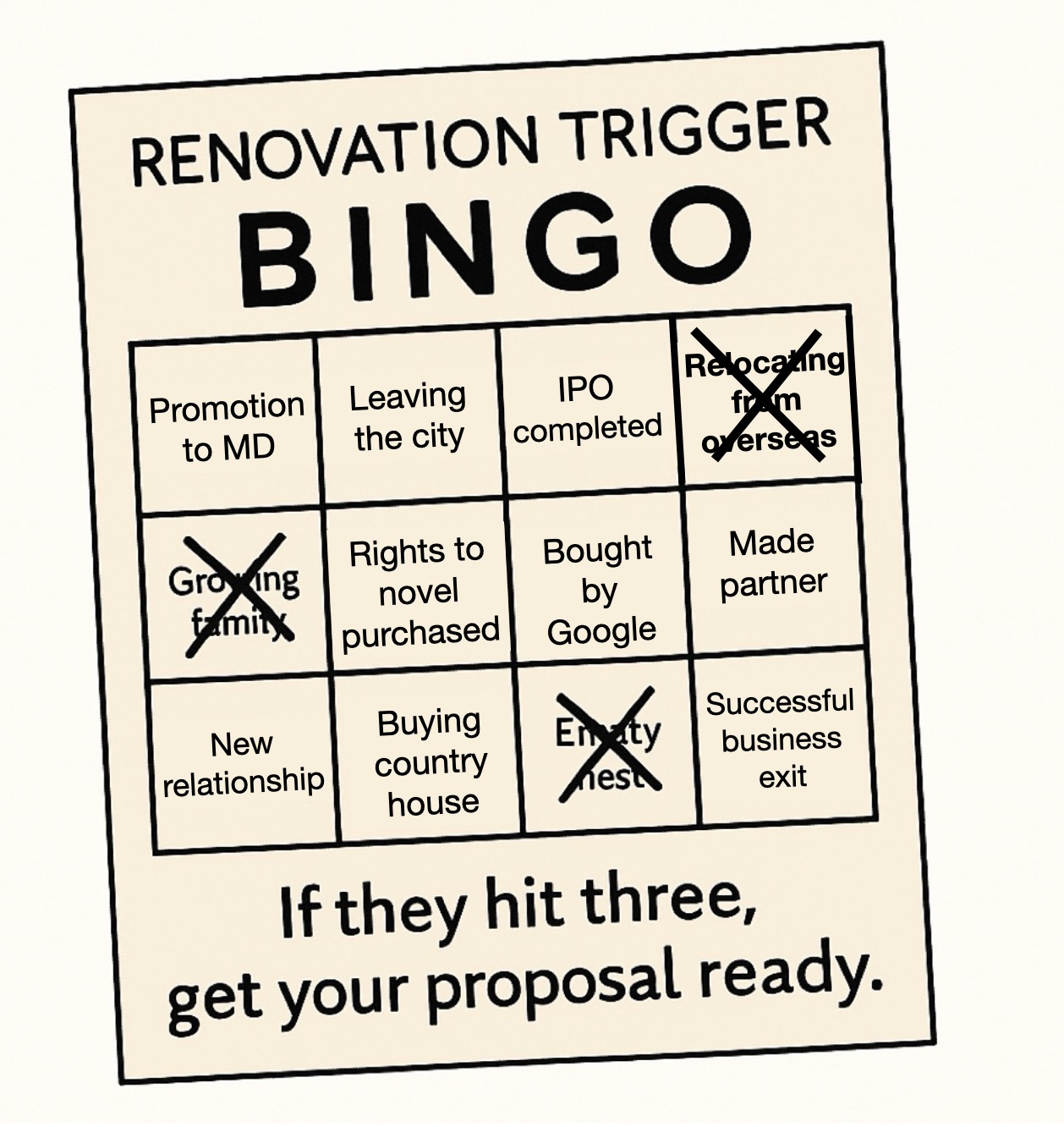
Why Interior Designers Should Study the Careers of Their Wealthiest Clients...
Apr 13, 2025…and what every designer should know about Magic Circle law firms, hedge funds, and high-achieving professionals.
As a residential interior designer, you learn quickly that creating beautiful rooms is only half the job. The other half? Understanding the people who live in them.
I spent the first 10 years of my career as a stockbroker working alongside corporate lawyers, bankers and asset managers - immersed in their world while fishing for high-net-worth clients in the same pool as residential interior designers.
In the 28 years since I transitioned to design practice, I’ve worked with clients from many walks of life, but a distinct pattern emerged. Again and again, my most lucrative and creatively satisfying projects came from clients who worked in Magic Circle law firms, Big Four accountancy groups, investment banks, private equity, and venture capital. These aren’t just job titles, they’re cultural markers.
And yet, if you asked interior designers what Slaughter and May is, or who competes with Blackstone, the majority wouldn't know.
This isn’t about snobbery. It’s about fluency.
If a client says they’re a partner at Linklaters, you need to understand what that means; not just the name, but the career journey, the lifestyle, the pressures, and what might motivate them to renovate or redesign their home.
To become a partner a Linklaters, your client will have worked very hard at school, gained entry to the best university, worked hard at university, and risen to the top even amongst a hugely talented, ambitious and dedicated peer group. It might actually appear rude not to understand and appreciate their achievement.
And furthermore, here’s the truth: high net worth individuals (HNWIs) prefer to hire peers, not people who need to have the basics explained.
Why It Matters
- Conversations run deeper when you understand the client’s world.
- You’ll ask smarter questions in your initial consultations – and earn trust faster (or, you won't ask silly questions).
- You’ll tailor your service to match their priorities: discretion, efficiency, and results.
- You’ll position yourself as a peer, not a service provider who needs handholding, helping you retain control once the project is underway, and reducing the likelihood of bad behaviour.
- You'll work smarter and faster because your client can relax knowing that you really get them - you can use shorthand instead of needing everything to be explained from first principles.
- You are more likely to be referred to colleagues when you show how well you understand their world.
And here’s something reassuring: many of these clients are already familiar with charging by the hour: it’s how they bill their own clients.
For them, time is money in the most literal sense. A clearly explained hourly rate or a well-structured fee proposal won’t scare them off - in fact, it will likely reassure them that you’re running a professional, competent business.
In short, if you want to work with the wealthiest clients, it's a really good idea to understand what made them wealthy.
Top Careers Behind the UK’s Wealthiest Residential Clients

Here are the professions most commonly linked to wealth in the UK – along with stereotypical profiles of the kinds of clients who frequently hire interior designers. These are not hard and fast rules, but provocative assumptions designed to make you think:
🔹 1. Magic Circle & Elite Law Firms
These are the powerhouses of commercial law in the UK. The 'Magic Circle' includes Clifford Chance, Allen & Overy, Freshfields, Linklaters, and Slaughter and May. Top US firms like Kirkland & Ellis and Latham & Watkins also compete in this space and often pay even higher.
Traits to understand:
These are commercial lawyers who specialise in areas such as M&A, litigation, tax, real estate, intellectual property, and banking law. They work long hours, think analytically, and expect structured, efficient communication.
Triggers for renovation:
• Promotion to equity partner
• Growing family or home relocation
• Upgrade to a property that reflects their professional status
What they value:
• Clarity, speed, and strategic presentation
• Trustworthiness and discretion
• Professionalism that mirrors their own working style
🔹 2. Big Four Accountancy & Consulting Firms
Senior partners at PwC, Deloitte, EY, and KPMG manage vast advisory portfolios, working with blue-chip clients and governments.
Traits to understand:
Pragmatic, financially literate, and risk-aware. They are trained to seek efficiency and logic, and often work in dual-career households. Process and accountability are key.
Triggers for renovation:
• Career milestones or promotions
• Second home purchases
• Family transitions like children leaving home
What they value:
• Clear systems, reliable schedules, and well-managed budgets
• Transparency in proposals and decision-making
• Calm, ordered progress with no hidden variables
🔹 3. Finance – Investment Banking, Hedge Funds, and Asset Management
This category includes some of the UK’s highest earners: Managing Directors at firms like Goldman Sachs or Morgan Stanley, hedge fund founders, and asset managers.
Traits to understand:
Extremely busy, results-driven, and used to making high-stakes decisions fast. Many operate under high pressure with limited personal time. They often fly under the radar socially but spend significantly on lifestyle and property.
Triggers for renovation:
• Bonus cycles or liquidity events
• Relocation, often international
• Legacy property upgrades
What they value:
• Time efficiency, turnkey service, and discretion
• Luxury service delivering bespoke results that signal quiet wealth
• High-functioning project management and minimal disruption
🔹 4. Venture Capital & Tech Entrepreneurs
Often younger and self-made, these clients may have built or backed high-growth startups, with wealth stemming from exits, IPOs, or equity windfalls.
Traits to understand:
Quick-thinking, innovation-driven, and design-literate. They’re often style-conscious and new to hiring interior designers, they'll expect modern, agile service.
Triggers for renovation:
• Startup sale, funding round, or IPO
• New home after cashing out or expanding family
• Combining tech-enabled smart living with personal expression
What they value:
• Creativity, speed, and a streamlined process
• Confidence without rigidity, they appreciate adaptability
• A collaborative dynamic where ideas evolve together
🔹 5. Private Medical Specialists
Surgeons, consultants, and clinical leaders, especially those working privately in Harley Street, Knightsbridge or specialist hospitals.
Traits to understand:
Highly educated, precise, and disciplined. Often in dual-career households. While financially conservative, they’ll spend readily when they trust the value proposition. There may be scope here to design their client-facing spaces too.
Triggers for renovation:
• Career stabilisation and income plateauing at a high level
• Growing families or planning for retirement
• Reputation-enhancing improvements for home consultations
What they value:
• End-to-end service that minimises their involvement
• Clear structure, well-reasoned decisions, and time-saving proposals
• Calm, elegant aesthetics that support wellbeing
🔹 6. Media & Creative Professionals
This group includes TV executives, film producers, authors, creative directors, and advertising professionals. While income can fluctuate, many earn substantial sums from royalties, production bonuses, or commercial rights.
Traits to understand:
Passionate about aesthetics and storytelling. Enjoy collaboration and are often spontaneous. Some may work with PAs or agents who handle logistics.
Triggers for renovation:
• Sale of rights or creative commissions
• Moving in with a partner, new contract, or shift in lifestyle
• Creating a home that reflects personal brand or taste
What they value:
• Originality, narrative, and creative chemistry
• Personal expression within a curated aesthetic
• Trust, intuition, and emotional intelligence
🔹 7. C-Suite Executives (FTSE 100)
CEOs, CFOs, and other executive leaders of major UK-listed corporations. These clients are often managing global teams and navigating public reputations.
Traits to understand:
Strategic, brand-conscious, and under pressure. Used to managing large budgets and delegating to experts. Time is scarce and privacy is valued.
Triggers for renovation:
• Promotion to C-suite or new corporate posting
• Returning to the UK from an overseas placement
• Investing in a forever home after years of corporate mobility
What they value:
• Strategic clarity and well-structured proposals
• Professional polish and trusted discretion
• A sense of control without needing to be hands-on
The profiles above deal in stereotypes: of course different individuals have different values and motives, and at this level there will be many shared values and concerns too.

The point of this list is to encourage you to think about your clients from a different angle, and to take an inquisitive, thoughtful and resourceful approach to researching clients in advance, arriving better briefed than the competition to that all-important first meeting.
⚠️ Be Prepared:
If you client turns out to be the Managing Partner of a global venture capital firm - or indeed a high-flyer in any of the careers mentioned above - you're not just discussing sofa fabrics, you're entering a contract negotiation with someone who closes multi-million-pound deals for a living.
That doesn’t mean you should feel intimidated. But it does mean you’ll need to be prepared - to level up your clarity, professionalism, and your business boundaries. These clients respect competence. They’re not expecting you to mirror their corporate career, but they’ll spot woolliness or uncertainty a mile off.
The more structured and confident your offer, the more likely they are to say yes, and to pay your fees without question. It goes without saying that your paperwork must be meticulous, and you must be prepared to be grilled on your operating practices, and decide how much you are willing to reveal on this front, and where you'll establish professional boundaries. Clients may ask intrusive questions about how you run your business, but you are not obliged to answer.
Research Your Clients Thoroughly In Advance
So, when a new client gets in touch, find gentle ways to probe their identity (and that of any partner or spouse) and investigate them online via Google, Companies House, and LinkedIn. If you can find out their career background, make sure you understand what they do, who they do it for, and a little bit about their industry in general. Not so that you can lead the conversation into these areas, but so that - when it comes up - you appear urbane and sophisticated, so you present as a peer.
Clients will feel uncomfortable hiring a designer who doesn't get them.
I should add, I’ve really enjoyed working with these clients. Their world can seem intimidating from the outside, especially if you’ve never worked with people in finance or corporate law. But in reality, they are often some of the most decisive, efficient, and appreciative clients you’ll ever have.
They’re short on time and have the financial means to take full advantage of your services. What they want is someone professional, trustworthy, and competent - someone who can unburden them of domestic decisions and deliver a result they’ll love, without the stress.
If you can offer that, and communicate it clearly, you’ll often find them warm, respectful, and generous clients.
You'll learn a lot from your HNWI clients, and it might help you to consider that many of these individuals are also service providers, themselves working with HNWIs. You quite possibly have shared clients, shared challenges, shared experiences. Above all, you will discover that underneath it all, they are just human beings.
Receive my quick-to-read weekly newsletter...
Sign up for the Hothouse Newsletter: find out what's coming up, and keep up with recent webinars, blogposts, videos, and other events - all focused on excellence in interior design practice.
We hate SPAM. We will never sell your information, for any reason.

